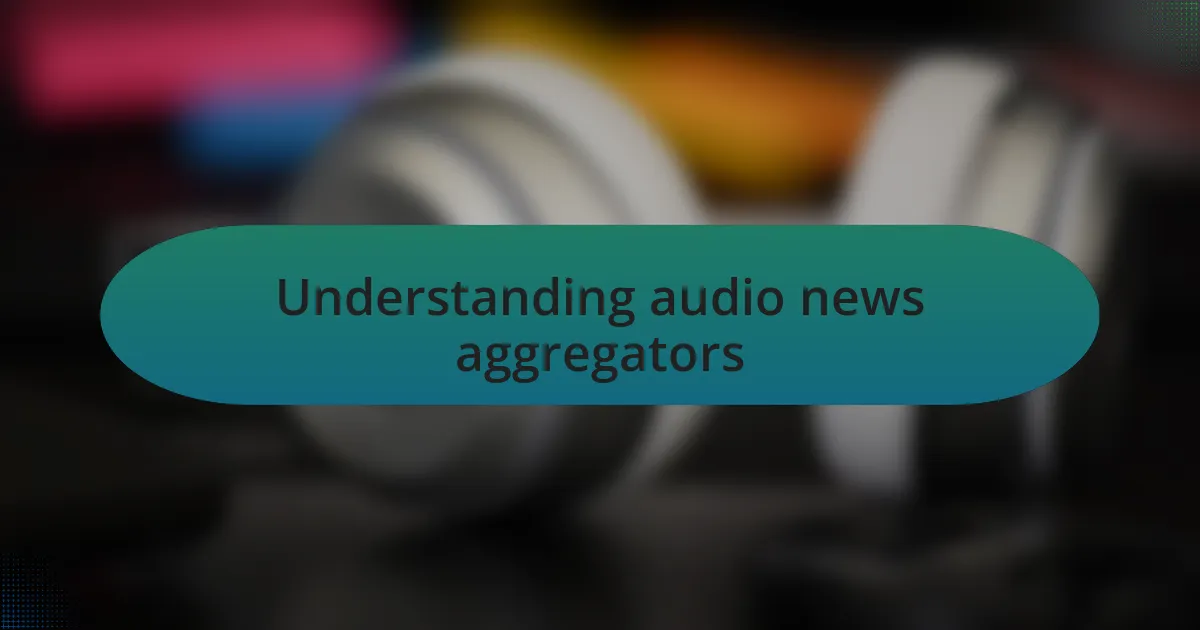Key takeaways:
- Audio news aggregators curate content from various sources, allowing users to receive customized news briefings and stay informed while multitasking.
- Quantum computing has the potential to enhance audio processing, leading to smarter and more responsive news delivery tailored to individual preferences.
- With the ability to process vast amounts of unstructured data quickly, quantum computing can improve listener feedback analysis and enhance content personalization.
- Integrating quantum technology could revolutionize how audio news aggregators recommend content, facilitating real-time updates and innovative storytelling.

Understanding audio news aggregators
Audio news aggregators serve as a bridge between the vast ocean of information and our daily lives. I remember the first time I stumbled upon one; it felt like opening a treasure chest of curated content. In a world that often feels overwhelming with constant updates, isn’t it comforting to have a service that filters out the noise?
These platforms gather audio content from various sources, providing listeners with customized news briefings. For me, the joy comes from being able to select topics that resonate with my interests. Have you ever noticed how certain news stories just stick with you, leaving you wanting to learn more? Audio news aggregators have a knack for presenting these stories in a way that not only informs but also engages.
Moreover, the flexibility of audio news aggregators allows users to absorb information while multitasking. I often listen during my morning walks, feeling connected to the world without sacrificing my routine. Isn’t it fascinating how technology can transform our consumption of news into a more enriching experience?

The role of quantum computing
The role of quantum computing is poised to revolutionize how we process information, particularly in fields like audio processing. I recall diving into the initial concepts of quantum algorithms and finding them both bewildering and fascinating. Just imagine the potential: algorithms that can sort through vast amounts of audio data in fractions of a second. Could this be the key to enhancing our audio news aggregators, making them smarter and more responsive?
In the realm of complex data analysis, quantum computers can handle intricate tasks far beyond the capabilities of classical systems. I often think about how this could reshape not just the accuracy, but also the personalization of news delivery. Don’t you find it intriguing that with quantum computing, audio news aggregators could tailor content even more precisely to fit our individual listening habits?
As advancements continue, the integration of quantum technology into audio news aggregation might unlock new ways to enhance user experiences. I imagine a scene where algorithms would predict topics of interest before we even realize we have them. Wouldn’t that be something? Such innovations could fundamentally change how we interact with news, making it not only more engaging but also more aligned with our needs.

Benefits of quantum computing
The benefits of quantum computing stretch into realms we are only beginning to imagine. For instance, when I first discovered how quantum algorithms can optimize search functions, it struck me as a game-changer for managing vast libraries of audio content. Have you ever felt overwhelmed sorting through countless options? Just think about a mechanism that could sift through all that clutter in an instant!
One major advantage lies in quantum computing’s capability to process unstructured data at unprecedented speeds. I vividly recall the moment I realized how this could transform the way we interpret listener feedback and trends. With this technology, audio news aggregators might analyze listener preferences on a nuanced level that was previously impossible. Isn’t it exciting to consider how data-driven insights could inform content curation, leading to an even more personalized listening experience?
Moreover, the potential for enhanced security cannot be overlooked. I often think back to conversations with fellow tech enthusiasts about the vulnerabilities of our data. Quantum computing offers advanced encryption methods that could safeguard sensitive information, ensuring our listening habits and preferences remain private. Wouldn’t it be reassuring to know that our data, which fuels personalized experiences, is protected by the cutting-edge security that quantum technology promises?

Impact on audio news aggregation
The impact of quantum computing on audio news aggregation is something I find particularly fascinating. Imagine discovering a tool that can not only categorize millions of audio clips but can also recommend tailored news snippets in real-time based on current events and user moods. I sometimes think about how frustrating it can be to miss breaking news. With quantum advancements, there’s a real possibility that audio aggregators could identify and push these urgent updates to listeners faster than ever before.
Furthermore, the ability for quantum computing to analyze complex data relationships opens up innovative pathways for audio storytelling. I remember a time when I struggled to connect disparate news stories into a coherent audio narrative for my listeners. With quantum algorithms, the potential to weave together various news threads into a seamless audio tapestry can redefine how we present information, making the listening experience not just informative but also deeply engaging. Wouldn’t it be exhilarating to tune in and hear a story that resonates personally, built from insights gathered in an instant?
Finally, I often ponder the implications of machine learning combined with quantum computing for enhancing content recommendations. Previously, I faced challenges in balancing what to curate for diverse audience segments. With quantum’s speed and analytical prowess at our disposal, audio news aggregators could tailor content like never before. This could elevate the listener experience, giving each individual precisely what they didn’t even know they wanted to hear. Imagine the thrill of discovering insightful perspectives from unexpected sources—all without the endless searching we once faced!